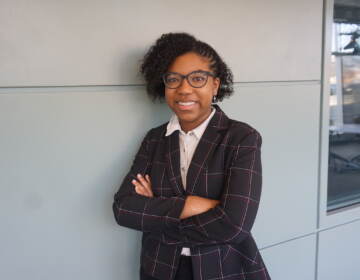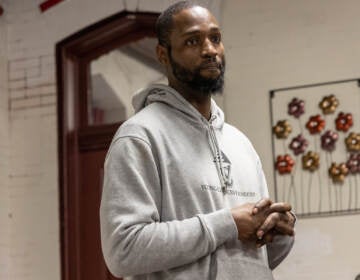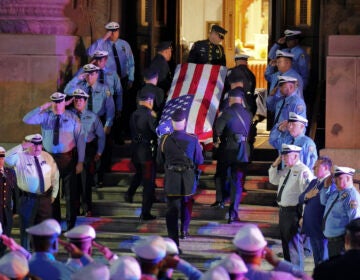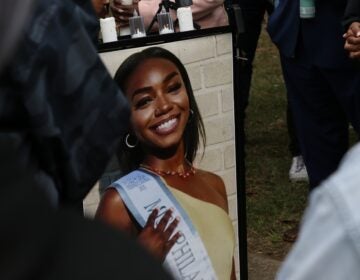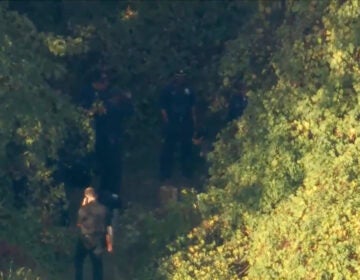Philly Police Commissioner Danielle Outlaw defends her approach to gun violence on IG Live session
Gun violence activist Pastor Carl Day hosted an IG Live chat with Police Commissioner Danielle Outlaw Wednesday. Outlaw defended her work despite recent public criticism.
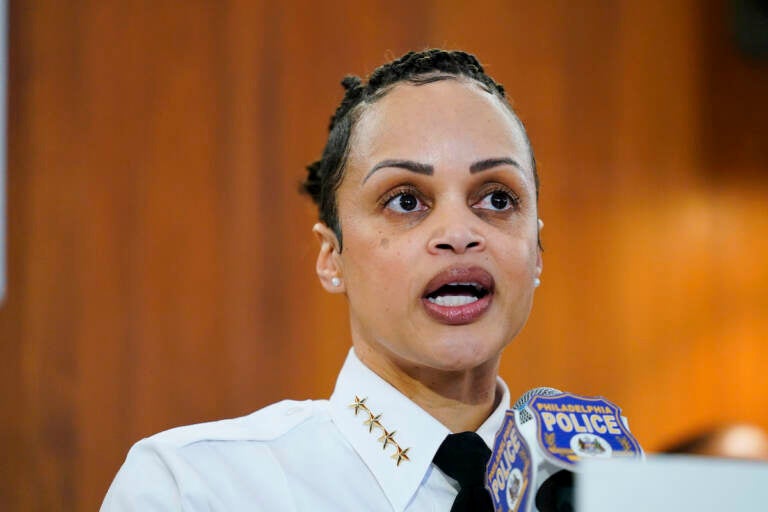
Philadelphia Police Commissioner Danielle Outlaw speaks with members of the media during a news conference in Philadelphia, Tuesday, March 8, 2022. (AP Photo/Matt Rourke)
Philadelphia Police Commissioner Danielle Outlaw defended her department’s approach to combating gun violence during a social media conversation Wednesday. Outlaw has faced public criticism since she took office in 2020, and some residents blame her for the continued gun violence crisis.
Pastor Carl Day, who works with former and potential gun violence perpetrators at Culture Changing Christians in Allegheny West, invited Outlaw to speak to his Instagram followers. He wore a cap and a sweatshirt reading “Pastor of the Hood” Wednesday, and addressed the roughly 100 people who tuned in to the live conversation
Outlaw appeared onscreen from her office and expressed a desire to be more transparent with communities affected by violence.
“Sometimes we just gotta drop what we doin’ and have a conversation,” she said. “It’s not always a press conference … everybody doesn’t read the paper. So if this is one of the best mediums to connect with folks and have conversations in the way that we do all day, every day, then let’s get it.”
Some Philadelphians called for Outlaw’s resignation after a 2021 report from the Office of the Controller found she improperly used aggressive tactics including tear gas against demonstrators in the aftermath of George Floyd’s murder.
More recently, mayoral candidate and former city councilmember Derek Green released a gun violence prevention plan and stated he would replace her if elected, and other candidates said at a recent public forum that they would also appoint a new commissioner.
Day said he personally reached out to Outlaw because he’d been getting so many questions from community members about public safety and policing.
“I think it takes tremendous courage and transparency and just a willingness to really meet people where they are,” he said. “Contrary to popular belief, you’re an actual person. You’re a real person, and you ain’t hiding or running from anybody.”
Outlaw started by acknowledging the challenge of taking her position during the COVID-19 pandemic.
“We were still fighting for PPE … and immediately had to shape and develop policy and determine what’s the best way for us to move,” she said, referring to difficult decisions such as how many officers could ride together in a car.
The two talked at length about police use of force in Philadelphia and nationally, and how to find the line between over-policing and enforcing the law.
Day implored listeners to remain open to building trust with police officers despite the history of harm they have caused in Black communities.
“I’ve been stopped, I’ve been frisked, I’ve been mistreated,” he said. “But I firmly believe in the culture of it, that you’re planting the seeds to eventually help evolve policing going forward. So like you said, that community trust. In order to create real public safety, we have to go hand in hand.”
He offered to meet with community relations officers from every police district in the city.
“We can really talk about the culture, the climate,” he said. “And I can provide that nuance from the community level, from the perspective of a lot of young, Black men, because I work with them day in and day out as to how we really can reconnect to community.”
Outlaw talked about changes she’s made since taking the post, including ending no-knock warrants, enacting implicit bias training, and hiring a diversity, equity, and inclusion chief.
“Nobody’s talking about how diverse my classes have been since I’ve been here,” she said. “We’re giving people an equal playing field so that we can continue to relate to the community and bring our lived experiences and solve problems in a different way.”
PPD is facing a severe officer shortage that’s expected to worsen. And an October audit from the Office of the Controller found the department is not strategically deploying its officers based on where violence happens, has not evaluated Operation Pinpoint — its primary violence prevention strategy — and is responding to calls for service from white residents faster than calls from Black and brown residents.
Just over 100 people tuned into the conversation between Day and Outlaw Tuesday.
If you or someone you know has been affected by gun violence in Philadelphia, you can find grief support and resources online.

Get daily updates from WHYY News!
WHYY is your source for fact-based, in-depth journalism and information. As a nonprofit organization, we rely on financial support from readers like you. Please give today.


